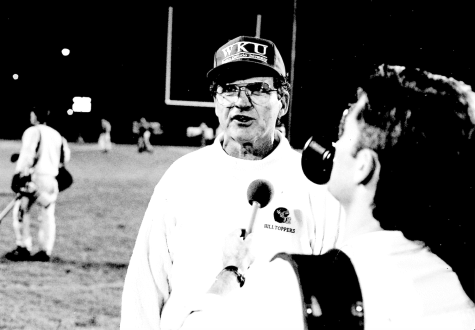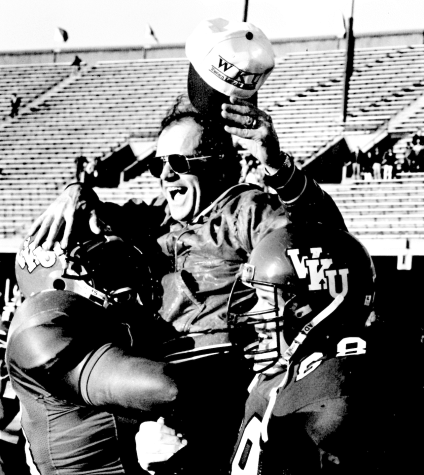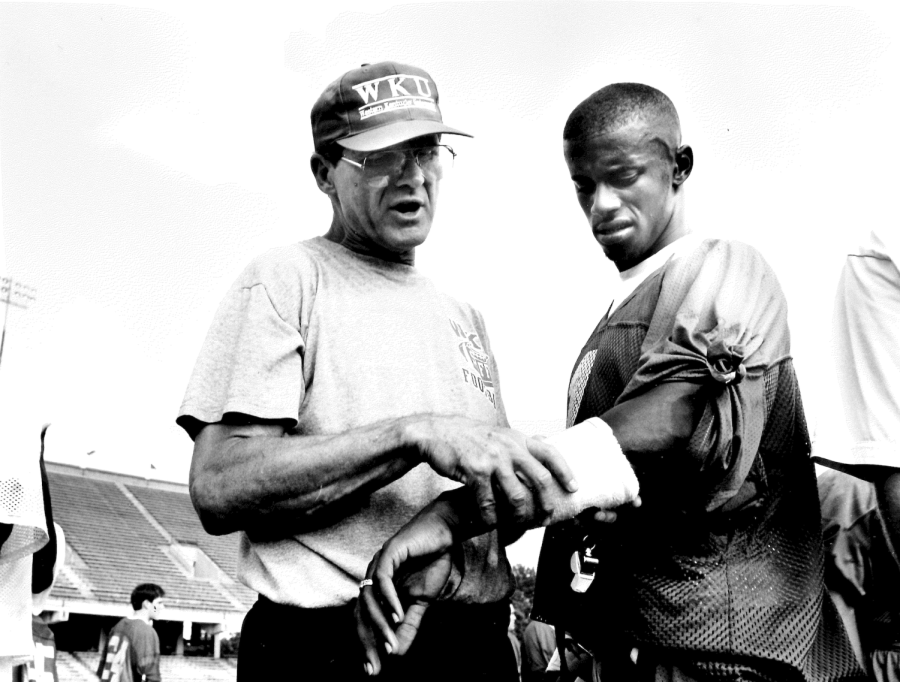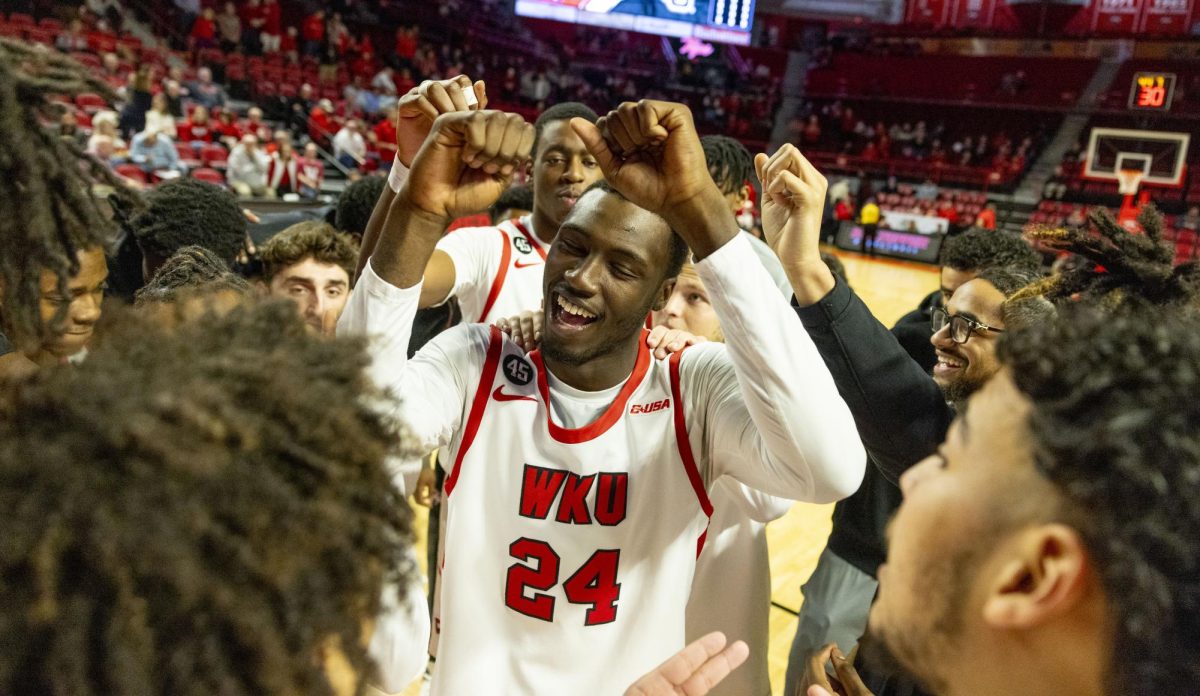‘I just thought this was divine intervention’: Harbaugh reflects 20 years after title
This story originally appeared in the Herald’s printed news magazine edition on Tuesday, Sept. 6.
September 13, 2022
Twenty years ago on a cold December night in Chattanooga, 57 seconds remained on Finley Stadium’s scoreboard.
McNeese State quarterback Ryan Corcoran lined up in the gun with two running backs on either side, trying to make something happen against the WKU defense. Corcoran was facing a 34-14 deficit in the Division I-AA Championship Game, the biggest stage either program could hope to reach.
With the ball snapped, Corcoran took a five-step drop before firing a pass over the middle of the field to his receiver. Charles Thompson, dressed in Hilltopper red and white, undercut the throw, sealing a WKU title.
The crowd of WKU faithful that had made the trip with their team exploded with joy. Players and coaches on the Hilltoppers’ sideline could finally let out a sigh of relief.
Head coach Jack Harbaugh, dressed in his red quarter zip with a WKU logo emblazoned on his left breast, khakis and a red baseball cap, grinned from ear-to-ear as he reached out to hug one of his players.
In that moment, he had reached the mountaintop – only three hours away from the city where he resurrected a dying football program.
THE MAN
Harbaugh’s love of sports began as a kid in the small village of Crestline, Ohio, in post-war America.
“We had about 12 or 13 guys who would meet at the south side schoolhouse every day in the summer to play eight hours of baseball and kick the can when the sun went down,” Harbaugh said.
He calls his old friends “the sandlot” after the 1993 movie of the same name because of how similar the movie was to his childhood.
All of the sandlot kids grew up wanting to be like Merle Hutson. Hutson played football for the short-lived Cleveland Indians in 1931 before coaching football and basketball at Crestline High School.
“We just became sports buffs,” Harbaugh said. “We just became sports enthusiasts by wanting to play.”
That love of sports carried into college at Bowling Green University in Ohio.
Harbaugh was recruited as a quarterback – but back in 1957, if you played quarterback, you had to play safety on
defense, too.
Harbaugh came up with three interceptions in a blowout win against No. 1 Delaware late in his junior year. That win propelled Bowling Green to its first undefeated season and the 1959 Small College National Championship.
After his senior season, he was selected by the Buffalo Bills in the 25th round of the 1961 American Football League draft. His professional stint didn’t last long – Harbaugh was soon cut from the Bills and his playing career ended.
“I went there and I couldn’t run fast enough, I didn’t have the skills to be a defensive back at the professional level,” Harbaugh said.
Harbaugh’s time at Bowling Green wasn’t for nothing. It put him in touch with his next idol and the man that would spur him down the coaching path – head coach Doyt Perry.
“Doyt Perry was my Merle Hutson in college for four years,” Harbaugh said. “Everything that I believed in as a coach down the line came from Doyt Perry. The way he coached, the philosophy of coaching, everything about coaching, it drove from my experience with Doyt Perry.”
Perry called film “pictures” and his players called him by his first name. In Harbaugh’s words, he was “outside the box” and didn’t look much like a football coach.
Perry never raised his voice, but when he talked, it resonated with his players.
“You’d be standing there figuring, ‘what the hell did he just tell me?’ and then you realize he was telling me that I control how good I was going to be,” Harbaugh said. “If I want to be good, I could be good.”
THE COACH
Following his exit from the pros, a former Bowling Green teammate told Harbaugh about a job opportunity in junior high coaching. He began coaching seventh and eighth graders at Canton McKinley High School.
“I can honestly say that the greatest experience I had in coaching was that first year coaching junior high school football,” Harbaugh said. The experience taught him that teaching and coaching are synonymous terms.

“[If] you’re a good teacher, you got a chance to be a good coach,” Harbaugh said. “If you’re a coach, you have to have been, or will be at some point, a teacher.”
Following his junior high coaching stint, Harbaugh got the call to coach at Bowling Green for three years before getting his big break at the University of Iowa for another two as defensive backs coach.
Harbaugh received a call during a 1973 recruiting trip. On the other end of the phone was Bo Schembechler, the head coach of the University of Michigan. He was looking for a new secondary coach because two of his staff members had left for Arizona.
Perry, from Harbaugh’s Bowling Green days, had recommended him for the job.
“Every job I got after I left Bowling Green, Doyt had something to do with it,” Harbaugh said. “He called somebody, he knew somebody and he recommended me. He recommended me to Michigan to Bo, which is the highest tribute or compliment he can pay you because he wasn’t going to send Bo somebody that he didn’t think could coach.”
Harbaugh went to Ann Arbor, Michigan, the next day. He and Schembechler talked for two hours about family, Bowling Green and Perry. Four days later, he called Harbaugh back and officially offered him the job.
“It took me about three seconds to say ‘yes,’” Harbaugh said.
THE FATHER
The life of a football coach is not sedentary. The constant moving around can take a toll on a family, one that Harbaugh began back in college.
On the first day of Perry’s class at Bowling Green, Perry said there were three things you need to be a great coach: you have to have passion for the game, you have to outwork everyone you compete against and you need to marry wisely.
In the next day’s class, Harbaugh ran into a Bowling Green cheerleader named Jackie. The November after they graduated they were wed, and in 2021, they celebrated 60 years of marriage.
“At one point in time, we came to the agreement that she was going to be the head football coach of our family, and I was
going to be the assistant coach, and I was going to do everything I could to assist her as the head coach,” Harbaugh said. “And she put together a team. That’s unbelievable in my eyes. She put this team together and I’m proud to have assisted her in it.”
Jack and Jackie started to grow their family a year into their marriage. They ended up having two boys, Jim and John, and a daughter, Joani.
In order to climb up the coaching ranks, Jack had to leave the quiet home life behind and move with whatever team he was coaching. January was the best time to find a better career opportunity, which often meant moving during the school year.
A lot of things fell on Jackie, whether it be finding a new school for the kids or getting the house ready for another move.
“I look back on it, I think to myself: ‘what an injustice I’m putting on our shoulders,’ but she handled all that,” Jack said.
The kids had to make new friends and fight for starting spots at new schools. Despite this, Jim and John remember this time fondly.
“The moves were, for us, just a new adventure,” John said. “We were thrilled because it was a new great team, and we were going to go do these crazy great things. It was awesome for us.”
THE RISE / THE FALL
Jack coached at Michigan from 1973-79, but his time there came to an end due to the “coaching bug.”
Most coaches moving up the ladder eventually become an offensive or defensive coordinator. Like Jack, most coaches who get the “bug” feel they aren’t moving up the ranks quickly enough and want to become a head coach.
Jack accepted a defensive coordinator job at Stanford to try and speed up the process. It ended up being a mistake.
“[I] moved my family across the country, and it was a little different,” Jack said. “It was a different culture out there. Football wise, I was there for two years, and they weren’t as fulfilling for me as they could have been. I probably [should have stayed] right here in Michigan.”
Jack got a chance to move back to Michigan in 1982, satisfying the “coaching bug” as the new head coach of the Western Michigan Broncos. His first season went smoothly, finishing 7-2-2 on the year and in second place in the Mid-American Conference.
The next four seasons didn’t go so well.
Harbaugh’s win total dropped each time before landing on a 3-8 record in 1986, second to last in the conference. His head coaching record stood at 25-27-3 when he was fired from Western Michigan in 1986.
“After five years, I got fired,” Jack said. “They were moving in a different direction.”
The experience was humbling for him, while at the same time giving him his greatest career lesson. Jack forgot who he was at Western Michigan. He thought he needed to change his personality to be a head coach.
“I realized that if I ever get another chance I’m going to try to rectify that problem,” Jack said.
He was then hired at Pittsburgh by his sandlot friend Mike Gottfried in 1987. Jack was an assistant coach there before getting another chance as a head coach in 1989 down in Kentucky.
“I thought I would never be a head coach again,” Jack said. “You only get one crack at that, one bite at the apple, one crack at it, and I had failed. I felt that was it. And then after two years at Pittsburgh, the Western Kentucky job came along.”
Another sandlot buddy, Joe Gottfried, knew WKU’s athletic director at the time, Jimmy Feix. Joe threw Jack’s name out and he got the job.
“Walking into that job, I decided I’m going to be me,” Jack said. “I’m going to do it just being me and see how it all plays out.”
THE HILLTOPPER
Jack’s first few years on the Hill didn’t go too well, putting together a meek 11-21 record across three seasons.
Jack’s situation at WKU took a turn for the worse in March 1992, when he and Athletic Director Lou Marciani were called into President Thomas Meredith’s office. They were given notice that the Board of Regents was going to vote to cut the football program at the end of April due to a state mandated $6.1 million budget cut for the 1992-93 fiscal year.
Jack knew that the team could be saved. With spring football around the corner, the decision was up to the players if they wanted to continue playing.
They voted unanimously to do so. The program received a tremendous amount of support from alumni, former players and fans.
“We used to get 2,000 people out to a scrimmage that spring…there was a public consensus that we should have football,” Jack said.
By the end of April, one vote had changed in favor of the football proggram, allowing it to stick around. However, there was a massive hit to the budget. Scholarships had to be taken away and the total of full-time coaching staff members dropped from six to four.
The Hilltoppers had to reschedule games because teams had dropped them from their slates in the event that the program was dissolved. The team was also missing essential needs.
“My mom [Jackie] had to go buy supplies for the shower,” John said. “She had to go buy soap, just like you would have bars of soap in the shower. She had to do the laundry, had to do the towels.”
Jim helped WKU out thanks to a personal sponsorship. He had played quarterback at Michigan and was drafted in the first round of the 1987 NFL Draft by the Chicago Bears. His brand deal with Fila provided uniforms for the Hilltoppers.
WKU bounced back from the brink of elimination with a 4-6 record before turning in a 8-3 record for the 1993 season. In 1994, the program’s savior came to the Hill thanks to Jim. He found and recruited Manatee High School’s star quarterback, Willie Taggart, out of Florida.
With Taggart under center, WKU finally turned the corner. Taggart started all four years, leading the Hilltoppers
to their first 10-win season and playoff berth under Jack. In his time there, WKU went 26-18. Taggart left WKU with the most rushing yards by a quarterback in Division I history.
Taggart came back to WKU in 1999 as a wide receivers coach and recruiter.
“He was our ace recruiter,” Jack said. “Every good player we ever recruited [to WKU], Willie Taggart hosted him, and he handled the locker room. Everybody was in lockstep in the locker room. He was our leader.”
THE CHAMPION
WKU piled up winning records from 1996-2001 with three NCAA 1-AA play- off appearances. It was hard to believe the same program was on life support just a decade earlier.
One of the leaders for the 2002 season was linebacker Sherrod Coates. He and Jack’s relationship started off a bit rocky.
“I was just an arrogant high schooler coming out [on] top of my football team,” Coates said.
In Coates’ second year, Jack pulled him aside because he was getting cocky on the field.
“He was like ‘listen, you’re stubborn and I’m stubborn’,” Coates said. “‘We both want the same exact thing, but you have to understand one thing: the only way you can get there is that you have to follow me. The guys will follow you anywhere you go, but you have to back me up, and we can win the national championship’.”
In contrast to how the story ends, the 2002 season didn’t start the way the Hilltoppers hoped it would with a 2-3 record to start the campaign. Coates said the defensive players were worried too much about technique instead
of just playing ball. The offense was switching players around, trying to find something that worked.
Eventually, things started to click. The Hilltoppers won their next six games by an average margin of 25 points, and before they knew it, earned a berth in the postseason for the third consecutive year – by the skin of their teeth.
“We were playing as a 15 seed out of 16 teams,” Jack said. “We just barely got in.”
WKU dominated Murray State in the first round of the playoffs before scraping by the next two contests against No. 2 Western Illinois and No. 3 Georgia Southern by three point margins.
What awaited the Hilltoppers in the championship game was a date with No. 1 McNeese State, the same team that handed WKU its last loss of the season in blowout fashion, in front of 12,000 fans in Finley Stadium down in Chattanooga, Tennessee.
WKU got off to a roaring start, building a 17-6 lead at the half and never looking back. Jack’s team ignored recent history and got revenge with a convincing 34-14 win.
After the game-sealing interception, Jack’s team took its rightful position in winning formation. Fifty-one seconds and two kneel downs later, the clock hit zero. Western Kentucky University had a champion.

The players rushed to the hill behind the south end zone adorned with the words “1-AA Championship.” The student section stormed the field with some fans jumping on the goal post, forcing it to the ground as Jack was handed the D1-AA National Championship trophy, to this day the only one in the program’s trophy case.
When Jack got off the bus to greet the abundance of fans waiting for their team at Houchens-Smith Stadium, he found himself in an introspective mood.
“I got off the bus, and I thought to myself: 44 years. 44 years I’ve been a coach, started out as a junior high school coach, been fired, [been] here at Western for 14 years, and what it was is a very mediocre coaching career up until that point,” Jack said. “There was nothing spectacular about my coaching career whatsoever. And for all of that to come to that point, having been a part of a national championship team, I just thought this was divine intervention, somebody telling me something.”
That divine intervention told him it was time to “get the hell out.” Jack saw only two ways to end a coaching career where people will still appreciate your work: winning a national championship, or dying on the job. That night in Chattanooga was his last game as a head coach.
THE LEGEND
Fast forward to 2022 and Jack is enjoying retirement with 11 grandchildren and two great grandchildren. They keep him busy with their own sports, reminding Jack of the times that his family would take long road trips together.
“You never get old when you turn the dadgum radio off, turn your phone off, ride with your grandchildren and just listen and converse and share the stories,” Jack said.
Both Jim and John followed in their dad’s footsteps to become football coaches. They loved the stories Jack brought home from his practices and would be in the locker rooms around the players forming friendships. Jack even invited his defensive backs over for dinner. Football was a way of life for them.
“When we grew up, we couldn’t imagine anything possibly better than being a football coach,” Jim said. “I didn’t think that there was any job a father could be doing other than being a football coach, as a kid anyway. I thought my dad had the most fun and most exciting job there was.”
John said he learned everything from his dad. Every principle, reaction, how he handled situations; it all came from Jack.
“Everything comes back to what we learned from our dad, and what he learned from the Doyt Perry’s and the Bo Schembechler’s that were in his way,” John said.
The brothers ultimately worked their way up to become NFL head coaches, Jim with the San Francisco 49ers and John with the Baltimore Ravens. They faced off in 2013 for Super Bowl XLVII in New Orleans, the first time in NFL history that brothers coached against each other for the Lombardi Trophy.
Even with the media attention surrounding the big game, Jack just saw his sons and thought back to when his boys played football together at Pioneer High School in Ann Arbor.
“For all those parents out there that ask that same question, ‘how did you feel when your two sons were competing in the Super Bowl?’ – the same way you felt when you watch your son or daughter compete in a junior high school competition, whether it be academics or athletics or anything else,” Jack said.
The game was a rollercoaster. John’s Ravens had a two-score lead at the half before the power went out in the Mercedes-Benz Superdome. Jim’s 49ers clawed back in the game and had a chance to win it in the fourth quarter, but a goal line stand propelled the Ravens to a 34-31 Super Bowl victory.
Jack was sitting with his family and long-time friend Bill “Doc” Edwards, who was the head athletic trainer during his time at WKU. Edwards told him that a parent can only be as happy as their unhappiest child.
Before celebrating John’s triumph, Jack went back to the 49ers’ locker room to check on Jim.
News reporter Wyatt Sparkman can be reached at [email protected].














